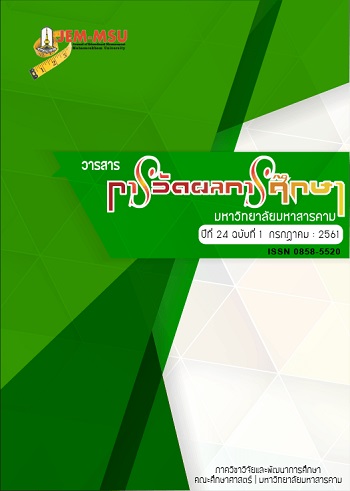A Development of Indicators for Learning Management Competencies of Pre-Service Teachers in Faculty of Education at Phuket Rajabhat University
Main Article Content
Abstract
The research objectives were to 1) develop indicators for learning management
competencies of pre-service teachers and 2) evaluate the overall model fit between
indicators for learning management competencies of pre-service teachers and empirical
evidence. The sampling group involved 1,173 teachers of Basic Educational Schools under
and administering of Phuket Rajabhat University in Ranong, Pang Nga, Krabi, Trang and Phuket
using multistage sampling technique. The research instrument was questionnaire. The data
was statistically analyzed using LISREL program for Confirmatory Factor Analysis (CFA) and
overall model fit evaluation between indicators for learning management competencies of
pre-service teachers and empirical evidence.
The research findings were as follows;
1. The indicators for learning management competencies of pre-service teachers of
Faculty of Education, Phuket Rajabhat University consisted of 4 factors including 17 indicators.
It can be divided into 1) Learning Management Planning (6 indicators), 2) Innovation for
Learning Development (4 indicators), 3) Lesson Planning (4 indicators), and 4) Assessment and
Evaluation for Learning Development (3 indicators)
2. The overall model fit evaluation between indicators for learning management
competencies of pre-service teachers and empirical evidence were all met ( 2 = 79.210, p =
0.3773, df = 75, 2/ df = 1.056, GFI = 0.990, AGFI = 0.980, CFI = 1.000, SRMR = 0.009, RMSEA=
0.005, = 0.720 - 0.870,
= .01). The most standardized indicator was used to create
assessment and evaluation tool regarding learning objectives, contents, indicators and learners
(Eva2), differentiated approaches (Ac3) ,optimal assessment and evaluation based on learning
objectives, contents, indicators and learners (Eva3) ( = 0.870, 0.860, 0.850) respectively.
Article Details
The content and information contained in the published article in the Journal of Educational Measurement Mahasarakham University represent the opinions and responsibilities of the authors directly. The editorial board of the journal is not necessarily in agreement with or responsible for any of the content.
The articles, data, content, images, etc. that have been published in the Journal of Educational Measurement Mahasarakham University are copyrighted by the journal. If any individual or organization wishes to reproduce or perform any actions involving the entirety or any part of the content, they must obtain written permission from the Journal of Educational Measurement Mahasarakham University.
References
และ(ฉบับที่ 3) พ.ศ. 2553. [ออนไลน์]. ได้จาก: http://media.wix.com/ugd/2cef27.pdf
[สืบค้นเมื่อ วันที่ 2 กุมภาพันธ์ 2559].
2. จิติมา วรรณศรี. (2552). คุณภาพการศึกษากับสมรรถนะของครูที่พึงประสงค์. วารสารศึกษาศาสตร์. ปีที่ 32,
ฉบับที่ 1 มกราคม – มีนาคม. : 1-5.
3. ชรอยวรรณ ประเสริฐผล, อนุชา กอนพ่วง, วิทยา จันทร์ศิลา, ฉลอง ชาตรูประชีวิน. (2556).รูปแบบการพัฒนา
สมรรถนะด้านการจัดการเรียนรู้ของครูใหม่โรงเรียนเอกชน ประเภทสามัญศึกษา. วารสารศึกษาศาสตร์
มหาวิทยาลัยนเรศวร. ปีที่ 15, ฉบับพิเศษ.
4. ทัศณรงค์ จารุเมธีชน. (2556). การพัฒนารูปแบบการประเมินสมรรถนะครูระดับประถมศึกษา สังกัด
สำนักงานคณะกรรมการการศึกษาขั้นพื้นฐาน. ปริญญาปรัชญาดุษฎีบัณฑิต สาขาวิชาวิจัยและ
ประเมินผลการศึกษา. มหาสารคาม : มหาวิทยาลัยมหาสารคาม.
5. นงลักษณ์ วิรัชชัย. (2542). โมเดลลิสเรล สถิติวิเคราะห์ สาหรับการวิจัย. พิมพ์ครั้งที่ 3. กรุงเทพฯ :
จุฬาลงกรณ์มหาวิทยาลัย.
6. ราชกิจจานุเบกษา. (2554). มาตรฐานคุณวุฒิระดับปริญญาตรี สาขาครุศาสตร์และสาขาศึกษาศาสตร์
(หลักสูตร ห้าปี). เล่ม 128 ตอนพิเศษ 62 ง หน้า 12.
7. ราชกิจจานุเบกษา. (2556). ข้อบังคับคุรุสภาว่าด้วยจรรยาบรรณของวิชาชีพ พ.ศ.2556. เล่ม 130 ตอนพิเศษ
130ง หน้า 72 – 84.
8. วิมลรัตน์ สุนทรโรจน์. (2553). การออกแบบการเรียนรู้ตามแนวคิด Backward Design. มหาสารคาม :
มหาวิทยาลัยมหาสารคาม.
9. ศศิธร เวียงวะลัย. (2556). การจัดการเรียนรู้. กรุงเทพฯ : โอ.เอส.พริ้นติ้งเฮ้าส์.
10. สำนักกรรมาธิการ 3. (2555). เอกสารประกอบการพิจารณา เรื่อง ครูพันธุ์ใหม่ คณะกรรมาธิการการศึกษา
สภาผู้แทนราษฎร ชุดที่24. วันพุธที่ 21 มีนาคม 2555 ณ ห้องประชุมคณะกรรมาธิการ หมายเลข 3601
ชั้น 6 อาคารรัฐสภา 3.
11. สำนักงานคณะกรรมการการศึกษาขั้นพื้นฐาน. (2553). คู่มือการประเมินสมรรถนะครู สังกัดสานักงาน
คณะกรรมการการศึกษาขั้นพื้นฐาน. กรุงเทพฯ : สำนักงานคณะกรรมการการศึกษาขั้นพื้นฐาน.
12. สำนักงานคณะกรรมการการอุดมศึกษา. (2552). กรอบมาตรฐานคุณวุฒิระดับอุดมศึกษาแห่งชาติ พ.ศ. 2552
และแนวทางการปฏิบัติ. กรุงเทพฯ : สำนักงานคณะกรรมการการอุดมศึกษา.
13. สำนักงานเลขาธิการคุรุสภา. (2558) หลักสูตรฝึกอบรม (หลักสูตรกลาง) มาตรฐานความรู้วิชาชีพครูของคุรุสภา
9 มาตรฐาน ปีการศึกษา 2558. กรุงเทพฯ : สำนักมาตรฐานวิชาชีพ สำนักงานเลขาธิการคุรุสภา.
14. อาภรณ์ ใจเที่ยง. (2550). หลักการสอน. พิมพ์ครั้งที่ 4. กรุงเทพฯ : โอเดียนสโตร์.
15. Forum Education Ministers’ Meeting. (2010). Pacific Islands Forum Secretariat, Forum
Education Ministers’Meeting Crown Plaza Hotel, Port Moresby, Papua New Guinea 13 –
14 October 2010 Session Four Improving Teacher Competency and Teaching
Effectiveness in the Pacific.
16. School of Education The College of William & Mary. (2014). Handbook for Practica &
Student Teaching Experiences. Williamsburg : U.S.A.
17. The National Institute of Education (NIE). (2009). A Teacher Education Model for the 21th
Century. Singapore : The National Institute of Education (NIE).
18. University of New Mexico College of Education. (2010). New Mexico Teacher Competencies
for Licensure. [Online]. Available from : http://teachnm.org/experienced- teacher/
nm-teacher-competencies.html?ai=1 [accessed 25 September 2017].


